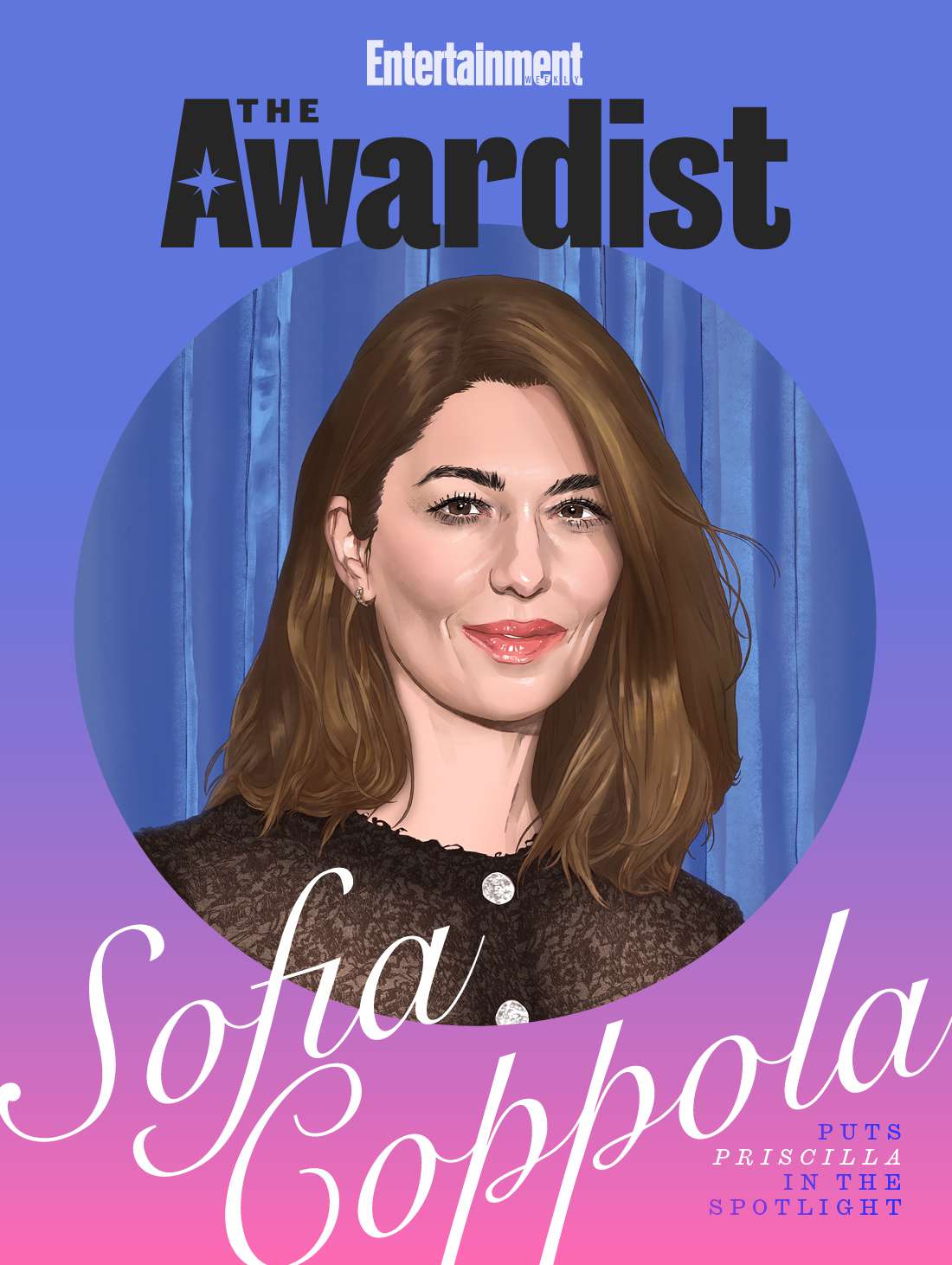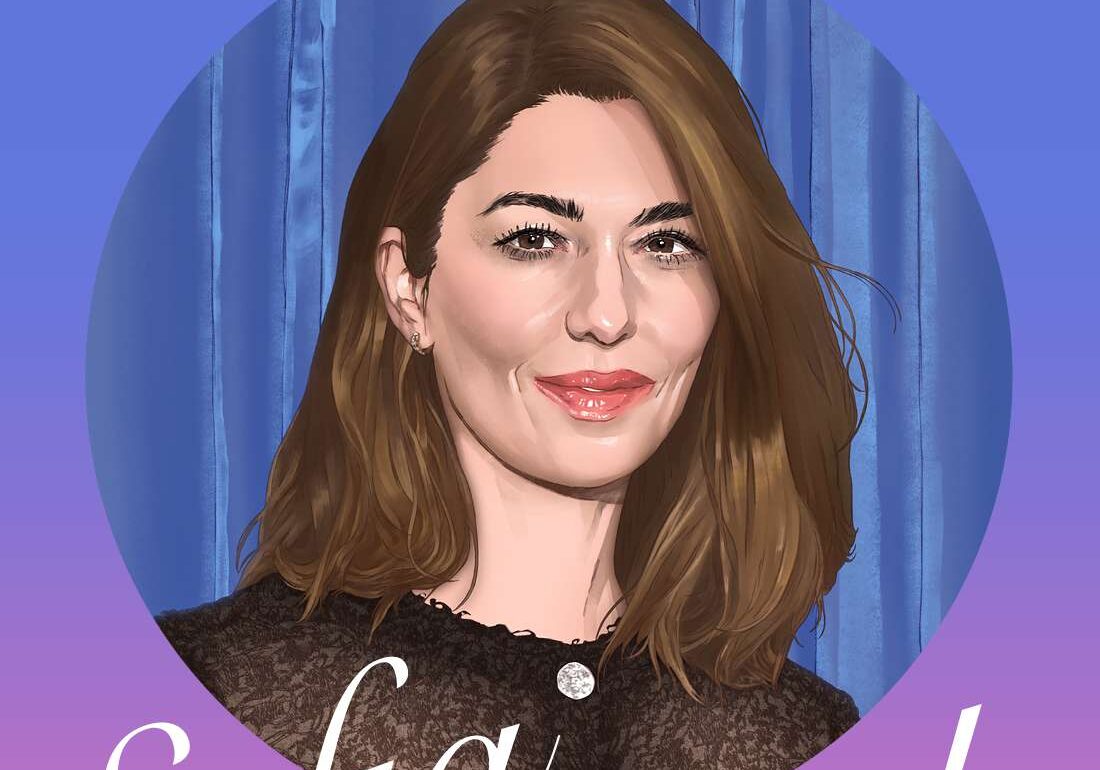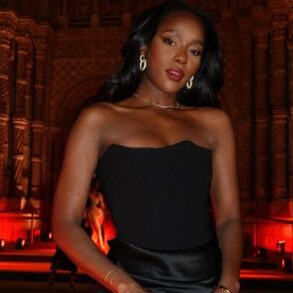
Priscilla director Sofia Coppola takes audiences behind the closed doors of Elvis and Priscilla Presley’s complex relationship
Interview by Devan Coggan
Illustration by Sarah Maxwell
In the 46 years since Elvis’, interest in his life has never waned. But now, it’s his ex-wife’s turn to tell her story.
Based on the memoir Elvis and Me, Sofia Coppola‘s Priscilla centers on Priscilla Presley, played by Cailee Spaeny (Mare of Easttown, The Craft: Legacy), as she meets the King of Rock & Roll — played by Euphoria and the upcoming Saltburn star Jacob Elordi — when he’s stationed at the same military base as her family in Germany. Just 14 years old at the time, Priscilla is still in high school, but 24-year-old Elvis can’t help falling in love with her. While he’s respectful of their age difference and refuses to act on any romantic feelings, that doesn’t stop him from convincing her family to let her move to Graceland after he returns to the States. Once there, she is essentially confined to his estate, finishing out her high school days.
But being the girlfriend and eventual wife of the biggest star in the world wasn’t the fairytale Priscilla thought it would be. In fact, he dictated how she dressed and what her hair color should be. She had no life outside of being Elvis’ girl…but even then, she wasn’t the only one.
Below, Coppola, Spaeny, and Elordi tell EW about the facets of the Priscilla and Elvis’ relationship that many didn’t know and how they navigated the complexities of the Presleys’ world, recall what it was like stepping onto the set of the recreated Graceland, explain how costumes, hair, and makeup helped transport them, and more.
A24
ENTERTAINMENT WEEKLY: Sofia, what was it about Priscilla Presley’s story that you were most drawn to?
SOFIA COPPOLA: I was really surprised because I realized how little we know about her. They’re such a mythic, famous couple — Elvis and Priscilla — but when I read her story, I had no idea she was going to high school while she was living in Graceland. I was really impressed with how she really reveals what their life was like, what her experience was growing up in such an over-the-top setting. Also, I was surprised with how universal it was, how relatable it was… She talks about her first kiss — I mean, of course, it’s Elvis, so we tried to show that in the movie: What would that be like, if your first kiss was Elvis, at school the next day and you can’t tell anyone? [We] try to show the feelings that she conveys in her story. But, yeah, your first kiss or, for me, becoming a mother or being the new kid at school — there’s all these things that I think are really universal. But then she describes it in this really interesting way because it’s ’60s Memphis with Elvis.
Cailee, I know you get to spend some time with the real Priscilla Presley. What was the most memorable moment of that time you got to spend with her?
CAILEE SPAENY: Yeah, I was lucky enough to sit down with Priscilla Presley herself, and growing up an Elvis and Priscilla fan, to have that moment with her was really extraordinary. Her reliving this part of her life again and going through those moments together and sort of watching her eyes light up talking about something or an inside joke they had, and she’d giggle again and you could just see her sort of going back to that time — I felt that was really special and such a key part in me trying to put this puzzle together.
Jacob, what was the most helpful thing in trying to unlock someone as mythic as Elvis?
JACOB ELORDI: I think it was…when you say that Elvis was mythic, I think that was probably the most helpful part, was ignoring the mythology and trying to find out where the real person lies in that.
A24
How did you approach the voice? Because he does have one of the most iconic voices in American history.
ELORDI: He was so well documented throughout his whole life, so there’s so many examples and iterations of his voice as he grew up. And then we had the freedom of going to a place where he wasn’t so well documented, behind closed doors, so I could play with it a little bit and try to make it a bit more grounded and attempt to make it sound more human, if that makes sense.
COPPOLA: Our story is really focused on them and their private life behind closed doors, them as real people. So that gave us some creativity, a flexibility.
ELORDI: When people are with their partners, there’s little voices that you do, and I think we had “Satnin” and stuff like that from the book and little pet names and things that kind of work their way into the voices naturally as well.
COPPOLA: When Priscilla saw the final movie, the first thing she said was, “That’s how I felt.” She really expressed that, and she couldn’t believe how Jacob’s voice…she said it sounded just so much like Elvis. That was so gratifying to hear that from her.
Ken Woroner/A24
The film gets into the darker elements of their relationship — sometimes it’s physical, sometimes it’s emotional. Sophia, how did you want to navigate some of those tenser moments of their relationship?
COPPOLA: Her book is really revealing and honest about the ups and downs, and I really wanted it to have all of that and not be one-note and feel real and complex and always try to have sensitivity and understanding for the characters. But I definitely wanted to have all the fun and excitement and glamour that she experienced and also the hard part in a complex relationship with an artist that was struggling. So I think it was a balance… and always trying to have sensitivity and understanding that the characters are human and be understanding for them while coming back to her point of view.
ELORDI: I think it was easy to do that too, because of Priscilla’s words, the way that she wrote about it — It was always acknowledging the complexities. Women from that generation and the strength of someone like Priscilla to be able to understand the kind of circumstances and the pressures that Elvis was under, playing that was more the goal for us than playing, now I’m physical towards you, or now I’m angry. There was always something under the surface that made it real.
SPAENY: You try to go into playing any character, but especially this story, without any judgment. I think this story was in safe hands and that we were respecting it and just being truthful and honest and wanted to make sure that she felt safe.
COPPOLA: Approaching it with sensitivity and that it was really important that I felt that Priscilla felt her story was represented in a way that was true to her.
What was it like walking around some of those Graceland sets and immersing yourself in that world?
COPPOLA: That was so exciting for me. We built it all on stages. So the art department, who was incredible — Tamara Devereux was the designer and her great team — we built Graceland in Toronto all on stages, and they had the original plans. So it was all built to the real Graceland plans except for the…
ELORDI: The ceilings.
COPPOLA: The ceilings are taller for Jacob. And we had tons of meetings with shag carpet and drapes and just wanting it to lavish, and Elvis loves some animal figurines and just to have all that to really go for it. And I hope the audience feels like they just get immersed in this world of Elvis and Priscilla at Graceland in the 1960s. So that was really fun to create that world and those colors, ’cause it’s just so different than how we live. And every time we would go on set it was like you would kind of sink into the shag carpet a bit and feel like you’re in their world.
SPAENY: It’s such a gift as an actor to be able to walk into a set that’s so immersive and everywhere you turn there’s something tangible. It’s a real playground, and I think leaning into the colors — it almost felt like you were walking into a pastry or a cake.
COPPOLA: Yeah, the living room felt like a wedding cake. That was one of our references.
A24/Youtube
Cailee, the costume designer, Stacey Battat, was telling me that you wore different shoes depending on how tall you needed to be in certain scenes. [Editor’s note: Elordi is reportedly 6’5″, while Spaeny is 5’1″].
SPAENY: We had a little bit of movie magic help. Whenever you didn’t see my feet, I had some different platform heels to try to make that work, or we built out walkways. So we had our tricks along the way.
Tell me a little bit about the costumes and the hairstyling, because we see Priscilla go through several different evolutions. What was fun for you about getting to play in all those different roles?
SPAENY: It was a real treat for all the [department heads] in terms of hair and makeup and costumes to get to play in this world, and a real anchor for me — because we shot this out of order in 30 days — to really lean into the costumes and the hair and the makeup. It was sort of the last missing piece for me to inform how I would hold myself and be able to play that age range realistically, but then also a huge part in her emotional journey as a woman and how makeup told a story. I love that moment in the movie where she’s applying false eyelashes right before she’s about to give birth; it just says so much without saying anything.
COPPOLA: It helped me whenever I would see her in the makeup and hair, I would know where we were in the story, at what point. And then at the end, I like how she is more natural — it’s the ’70s and she’s kind of coming back full circle to her true self in a way after the artifice of being this doll, which had its fun. But also you really see her evolution in that.
Sabrina Lantos/A24
ELORDI: What’s interesting, too, is when you’re finding your liberation, you have denim jeans on. He hated denim because he associated it with being poor, where he came from. And so we never had denim. It wasn’t deliberate, but when she came out with the brown hair and she has denim on…
SPAENY: And she has little makeup on. She didn’t have black hair anymore.
COPPOLA: She’s starting to find her own.
You can hear EW’s full interview with Priscilla writer/director Sofia Coppola and stars Cailee Spaeny and Jacob Elordi the latest episode of The Awardist podcast, below.
Get the latest awards season analysis and hear from the actors, creators, and more who are contenders this season on EW’s The Awardist podcast, hosted by Gerrad Hall. Be sure to listen/subscribe on Apple Podcasts, Spotify, Google Podcasts, or wherever you listen to your favorite podcasts, or via your own voice-controlled smart speaker (Alexa, Google Home).
Heat Index | Contender or Pretender?
More contenders are opening, and the Gotham Awards have weighed in with nominations. Here’s a look at who’s up and who’s down right now.
By Joey Nolfi
Warner Bros / A24 / Pixar
Who’s up:
SUPPORTING ACTOR: Ryan Gosling, Barbie — In what feels like an ironic twist of fate, given Barbie‘s thematic focus, the actor behind Ken is getting the most pre-Oscars attention from awards groups (and pundits) so far. Though Barbie was technically eligible (and reportedly submitted) for Gotham Awards consideration following the group’s newly lifted cap on budgets, Gosling landed the titanic hit’s sole nomination.
PICTURE, ACTRESS: Greta Lee, Past Lives — Thanks to voting body inconsistencies, the Gotham Awards typically don’t hold weight outside of anointing a Best Picture winner that, coincidentally, can predict the Academy’s corresponding choice in the same category. These early bird nominations can also bolster an acclaimed, smaller film like Past Lives‘ platform at the top of the race, and with three nods overall and an interim agreement in place for guaranteed visibility ahead, things are looking up for this prestige favorite and its central star.
ACTRESS: Cailee Spaeny, Priscilla — Spaeny’s portrayal of the titular figure in Sofia Coppola‘s Priscilla Presley biopic continued building a stacked report card with a nomination at the Gothams — just over a month after she won Best Actress at Venice. Here, the awards body itself might not mean much, but Spaeny stacking recognition this early in the season shouldn’t be ignored.
ANIMATED FEATURE: Elemental — With 20 category nominations in the category’s 22-year history, Disney is the safest bet in the industry for a Best Animated Feature nod. When compared against past releases, though, the film didn’t perform well out of the gate at the box office. That narrative plagued it from the start, though it has gone on to quietly earn nearly $500 million globally, atop generating the studio’s biggest premiere streaming numbers of the year. So, word of mouth is on Elemental‘s side.
Who’s down:
PICTURE: Maestro — Bradley Cooper‘s directorial follow-up to A Star Is Born launched strong out of Venice, but as it’s traveled the globe, reviews have quieted. While Cooper and lead actress Carey Mulligan feel safe for their lauded (and, arguably, career-best) portrayals of real-life entertainment figures in the biopic, the film overall feels like it could lose momentum as it rolls out.
On the horizon:
With the primary fall festivals in the rearview, the last major festival on the circuit is AFI Fest, which is currently underway and could give one final publicity boost to Maestro, American Fiction, and recent Gotham Awards nominations leader All of Us Strangers. We’re also on the cusp of critics season, with the New York Film Critics Circle, Los Angeles Film Critics Association, and more gearing up to announce their respective nominees. The NYFCC is set to go first on Nov. 30.
Read Joey’s full analysis here of those movies, performances, and Gotham Awards nominees.
Oughta Get a Nod: Denzel Washington for The Equalizer 3
Stefano Montesi/Columbia Pictures
An action threequel released in September is as far as you can get from Oscar bait, but Denzel Washington‘s performance in The Equalizer 3 further solidifies his status as one of our greatest living actors. After two movies of seeming indestructible, this third installment presents Washington’s character Robert McCall at his most vulnerable — for most of the movie, he’s recovering from an injury in a picturesque Italian village, creating a fascinating inner tension between the actor’s usual commanding confidence and his character’s physical unsteadiness. The film gives Washington ample opportunity to make the most of quiet, reserved scenes, demonstrating his unrivaled ability to make the simplest behaviors into riveting cinema: the way he fiddles with a napkin at a cafe or taps his cane on cobblestone streets feels both profoundly intentional and entirely natural. And he unsurprisingly delivers the hell out of numerous monologues, making fairly standard genre fare sound downright Shakespearean. —Wesley Stenzel
Attention, entertainment union and guild members: We want to hear from you! Please participate in this quick, 3-minute survey about your background and your interest in receiving special FYC materials and invitations from Entertainment Weekly. Thanks!
Oscars Flashback
TIMOTHY A. CLARY/AFP via Getty Images
Michael caine | Best supporting actor, 2000 | the cider house rules
I was thinking of how the Academy changed ‘The winner is…’ to ‘The Oscar goes to…’ — and if ever there was a category where the Oscar goes to someone without there being a winner, it’s this one because I do not feel like being the winner. You have [Michael Clarke Duncan], who I’d never heard of quite frankly, who is astonishing. You have [Jude Law], who is going to be a big star no matter what happens. You have [Tom Cruise], who, if you had won this, your pot price would have gone down so fast. Have you any idea what supporting actors get paid? And we only get one motorhome, a small one. And Haley Osment, what an astonishing… Haley, when I saw you I thought, well that’s me out of it. So really, I’m basically up here, guys, to represent you as what I hope you will all be, a survivor.”
— Michael caine | Best supporting actor, 2000 | the cider house rules
The Snub That Still Hurts: Bradley Cooper for A Star Is Born
Everett Collection
As Jackson Maine in his 2018 remake of A Star Is Born, Bradley Cooper gave one of the best performances of the decade. Transforming himself into a greasy-haired rock star with a velvet, whiskey-soaked growl, he delivered a devastating portrait of a man in freefall. Jackson is a musical genius, buoyed by the unconditional love of his musical discovery, Ally (Lady Gaga) — but it’s not enough to overcome his demons. Cooper made the tried-and-true cautionary Hollywood tale into something visceral, raw, and revelatory, making the fourth remake of Star its most affecting yet. It hurts all the more that Cooper lost to Rami Malek‘s Freddie Mercury, who couldn’t approach the level of Cooper’s musicianship and vulnerability on screen. Sure, Malek campaigned hard and Cooper put all his eggs in the directing basket — but Cooper’s loss here is a damning indictment of the entire awards campaigning system. Academy, why did you do that, do that, do that, do that to me? —Maureen Lee Lenker
Sign up for Entertainment Weekly‘s free daily newsletter to get breaking TV news, exclusive first looks, recaps, reviews, interviews with your favorite stars, and more.
Related content:
This post was originally published on this site be sure to check out more of their content.









